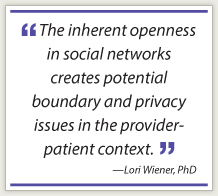To friend or not to friend? That is the question many social networkers ponder daily. Oncologists and other health professionals considering “friend” requests from patients would be wise to first consider the potential pitfalls and perils of accepting such requests, according to an article written by a multidisciplinary group of health professionals from the National Cancer Institute and the National Institutes of Health and published by The Journal of Oncology Practice (JOP).1
“Communicating with patients on social media sites can cross professional-patient boundaries, risking patient confidentiality, exposing patients to inappropriate details of physicians’ personal lives, and jeopardizing therapeutic relationships,” the authors pointed out. “Connecting with patients through online venues can also pose risks to providers’ reputations, safety, privacy, and work-life balance.” These social media include blogs, social networks such as Facebook, Twitter, and LinkedIn, multimedia sharing on YouTube, and private websites for people with specific health challenges.
Slippery Slope
 In an interview with The ASCO Post, Lori Wiener, PhD, the article’s lead author cautioned physicians and other health professionals to remember the respective roles of providers and patients. “They are not our friends. They come to us to be our patients and for us to be their providers,” she said. “It is a slippery slope when we introduce patients into our lives as ‘friends’ and they have access to a lot of information about their providers and we about them.” Dr. Wiener is Codirector of the Behavioral Science Core and Head of the Psychosocial Support and Research Program in the NCI’s Pediatric Oncology Branch.
In an interview with The ASCO Post, Lori Wiener, PhD, the article’s lead author cautioned physicians and other health professionals to remember the respective roles of providers and patients. “They are not our friends. They come to us to be our patients and for us to be their providers,” she said. “It is a slippery slope when we introduce patients into our lives as ‘friends’ and they have access to a lot of information about their providers and we about them.” Dr. Wiener is Codirector of the Behavioral Science Core and Head of the Psychosocial Support and Research Program in the NCI’s Pediatric Oncology Branch.
Patients (and not only those you directly “friend,” but friends of their friends as well) can discover personal information about your religious, political, and lifestyle choices or perhaps view unprofessional images. “The oncologist may discover personal information about a patient that places him or her in an awkward situation,” the JOP article noted. This could include information about patients’ recreational drug use and risky sexual behavior. “Moreover, information learned by either the provider or the patient via social networking can create ethical tensions,” according to the article.
Intense Relationships
“Especially in an oncology practice,” Dr. Wiener noted, relationships between patients and families and medical staff members “are quickly developed because care has to start quickly, and they can be very intense. Because of the amount of time spent between staff and families, discussions go past medication, toxicities, treatment, and prognosis to other things that are going on in people’s lives. It is almost as if a pseudo-family/friendship relationship evolves.” This is particularly likely in pediatrics, she said, because parents often need “to feel a sense of closeness to the staff who are taking care of their child.”
 Before the widespread use of social media, “there were pretty simple rules,” Dr. Wiener said. “You don’t talk about a patient in an elevator or the cafeteria. You clearly don’t give out your telephone number. Then in 1996, when Congress enacted the Health Insurance Portability and Accountability Act (HIPAA), there was a whole new set of rules. We needed to safeguard all medical information, and it wasn’t just an ethical responsibility. It became the law,” she said.
Before the widespread use of social media, “there were pretty simple rules,” Dr. Wiener said. “You don’t talk about a patient in an elevator or the cafeteria. You clearly don’t give out your telephone number. Then in 1996, when Congress enacted the Health Insurance Portability and Accountability Act (HIPAA), there was a whole new set of rules. We needed to safeguard all medical information, and it wasn’t just an ethical responsibility. It became the law,” she said.
“Many centers now have social media policies,” Dr. Wiener added, “and if they don’t, they are developing them quickly, because they are learning this can be a slippery road for them.” Some centers have institutional Facebook pages so patients can learn about new programs and protocols and connect to the person in charge. “At NIH, we can’t even access Facebook. It is denied. We can’t get it on our computers at all,” Dr. Wiener said. “But many centers really struggle with telling people what they can and cannot do once they are at home.”
So Why Would You Do It?
Even professionals aware of the potential pitfalls and perils of accepting a friend request from a patient may do so anyway. “They are put in an uncomfortable position. They don’t want to hurt somebody’s feelings or make patients feel like they don’t want to talk to them,” Dr. Wiener said.
In addition, she said, there can be “a false safety perception” that can arise from having privacy settings on. “But your privacy settings today may no longer be private tomorrow,” she noted. “And even if you decide that you just want to talk to someone and you are not giving any personal information, that person now has access to your friends and what’s on your site.” As the article points out, “the inherent openness in social networks creates potential boundary and privacy issues in the provider-patient context.”
Dr. Wiener also advises against discussing work-related issues on personal sites or posting photographs depicting behavior that might be problematic, such as drinking. “Professionally, it is not wise, especially for people looking for new jobs.”
Physicians and other health professionals should pause and think of the possible consequences before accepting a friend request, Dr. Wiener stressed. “Or if they have already accepted, they should give some thought to ‘unfriending’ in a way that is respectful while maintaining those professional relationships, which is what everybody wants.”
What would you do if the patient is expressing suicidal ideation? Boasts about not taking their medications? Says bad things about you, your practice, your staff? ■
Disclosure: Dr. Wiener reported no potential conflicts of interest.
SIDEBAR: Social Media: A Generational Thing?
Reference
1. Wiener L, Crum C, Grady C, et al: To friend or not to friend: The use of social media in clinical oncology. J Oncol Pract 8(2):103-106, 2012.

